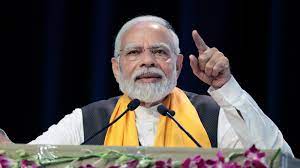By Girish Linganna
On Tuesday, February 13, India and the United Arab Emirates inked a deal to establish a trade route designed to link Europe and India via certain regions of the Middle East by both sea and rail. This grand project has received support from both the United States and the European Union. India is highly interested in this project as it sees it as the one competing with China sponsored Belt and Road Initiative (BTI) which is already in operation as a global project covering a large number of nations.
The agreement was disclosed following a visit to the Gulf nation by Indian Prime Minister Narendra Modi, as per a statement from the Indian foreign ministry, although specific details of the agreement were not extensively shared.
The ministry’s statement highlighted that this initiative would enhance existing collaborations and mutual understanding between India and the UAE, promoting greater cooperation and regional connectivity.
Announced in September during the G20 summit held in New Delhi, the corridor is planned to stretch from India, across the Arabian Sea to the United Arab Emirates, then onwards through Saudi Arabia, and link up through Jordan and Israel to Europe.
In its statement, the ministry did not reference any nations other than India and the UAE, a key Gulf Arab nation, with which India shares a history of trade relations spanning over a hundred years.
The pact concerning the India-Middle East Economic Corridor emerges during an ongoing conflict in Gaza exceeding four months, which has disrupted efforts supported by the U.S. to enhance Israel’s integration with surrounding Arab countries. Consequently, Saudi Arabia has put its plans for normalization on hold.
During his visit, Modi had a meeting with UAE President Sheikh Mohamed bin Zayed al Nahyan, whom Modi frequently calls his brother.
“In these challenging times for our region, our strong ties with you bring us much optimism and pave the way for a future with India that aligns with our aspirations,” Sheikh Mohamed expressed in a meeting with Modi on Tuesday, as shown in a video posted on Modi’s YouTube channel.
In 2020, the UAE established diplomatic ties with Israel as part of the Abraham Accords, a move supported by the U.S. that also saw Bahrain and other Arab nations forming connections with Israel.
Throughout the conflict, while maintaining relations with Israel, the UAE has also consistently criticized the airstrikes in Gaza and advocated for a ceasefire.
The agreement between India and the UAE indicates both countries are keen on proceeding with the corridor project, potentially challenging China’s Belt and Road Initiative that aims to expand global trade and infrastructure links.
Furthermore, the agreement was reached amid assaults by Yemen’s Houthi faction on ships navigating the Red Sea, actions claimed by the Iran-supported group as a protest against Israel’s actions in Gaza. These attacks have posed risks to maritime trade in the region.
Additionally, the UAE and India finalized a treaty on bilateral investment and exchanged agreements to collaborate in areas including electrical connectivity, commerce, and digital infrastructure.
This marks Modi’s seventh journey to the Gulf country since his tenure as Prime Minister began almost ten years ago, reinforcing the relationship with one of India’s leading trade allies.
Prime Minister Narendra Modi, during his two-day trip to the United Arab Emirates (UAE), opened Abu Dhabi’s inaugural Hindu temple on Wednesday. Located near Al Rahba in Abu Mureikhah, the temple, developed by the Bochasanwasi Shri Akshar Purushottam Swaminarayan Sanstha (BAPS), spans approximately 27 acres. Construction has been underway since 2019, with the UAE government providing the land for the temple. In anticipation of PM Modi’s speech at the World Government Summit , the BurjKhalifa displayed the message – “Guest of Honour – the Republic of India.”
Speaking to the Indian community at the ‘Ahlan Modi’ (Welcome Modi in Arabic) gathering at Zayed Sports Stadium in Abu Dhabi, Prime Minister Modi lauded India and the UAE as “allies in development.” He mentioned that the relationship between these two strategic allies sets a global benchmark and that they are forging a new narrative in the third decade of the 21st century. “The accomplishments of India and the UAE, in both communal and cultural aspects, stand as an exemplary model for global emulation,” he stated.
The two nations also agreed on a deal to connect their domestic payment systems — India’s RuPay with the UAE’s JAYWAN. The Ministry of External Affairs (MEA) described this as “a significant move towards fostering cooperation in the financial sector… (and) will broaden RuPay’s acceptability throughout the UAE.” (IPA)


